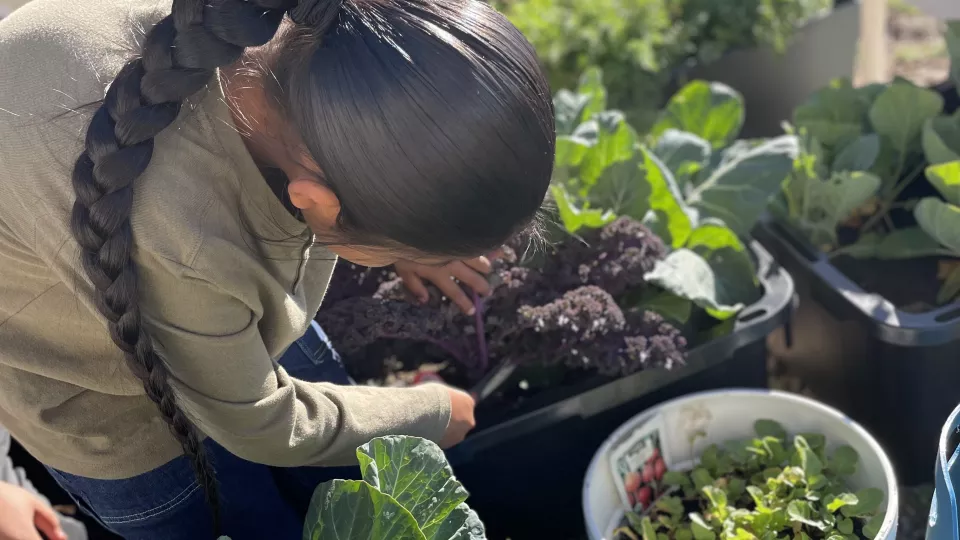
Pictured above - Santa Rosa Ranch School Student harvests leafy greens from a raised pot in their school garden.
Bureau of Indian Education schools across the nation are cultivating more than just young minds. They are fostering hands-on learning experiences by implementing school gardens. This initiative embraces Indigenous cultural teachings and practices while providing valuable educational opportunities.
Many Tribal communities have long-standing traditions of growing and harvesting food, a value that BIE schools aim to instill in students. By incorporating school gardens into their curriculum, these institutions offer interactive learning experiences that educate students about botany, nutrition, and traditional Indigenous farming practices.
At Santa Rosa Ranch School in Sells, Arizona, first through third-grade students collaborated on a school garden project designed to teach them about food security, healthy eating, and the value of growing their own food. This multi-age project fosters teamwork and an appreciation for those involved in food production.
The hands-on nature of gardening provides a unique and engaging educational experience beyond the traditional classroom setting. Students learn responsibility and patience through planting, maintaining, and harvesting gardens. They witness firsthand the life cycle of plants and gain practical knowledge of food production. This experiential learning fosters a sense of pride and accomplishment as students see the results of their hard work.
Second graders at Turtle Mountain Elementary School in Belcourt, North Dakota, work hard to maintain their garden. The class uses a hydroponic garden tower to grow salad greens and herbs. Hydroponic gardens are a space-saving way to grow plants indoors. This process allows plants to grow in containers where water and nutrients are delivered directly to their roots without the use of soil. Through this project, Turtle Mountain students learn about the plant cycle and explore how to prepare healthy recipes. Students also share what they grow in their school lunch.
BIE school gardens are also crucial in bringing the school and local community together. These gardens offer community members opportunities to contribute, whether it is through lending a hand, sharing gardening expertise, or participating in harvesting what is grown. These collaborative efforts strengthen relationships and create spaces for shared learning.
A wonderful example of this can be found at Chitimacha Tribal School in Jeanerette, Louisiana. Here, eighth-grade students actively tend to their garden on the Chitimacha Reservation, providing fresh produce for all community members and highlighting the power of teamwork and shared traditions.
These gardens function as outdoor classrooms, laying the foundation to cultivate students' interests in agriculture and food production. A passion for agriculture can easily follow students into their secondary education journeys through programs at BIE colleges and universities.
The BIE, Native American Agriculture Fund, and Haskell Indian Nations University recently announced a pioneering agriculture business degree program to enhance financial literacy among Native farmers and ranchers. This program, housed within Haskell’s business school, seeks to empower Indigenous agricultural professionals and address financial barriers to success in Indian Country.
Southwestern Indian Polytechnic Institute hosts a student garden that offers invaluable hands-on experience. Students engage in a variety of activities ranging from conducting soil samples to researching agricultural practices and cultivating traditional plants. This immersive experience allows students to explore diverse facets of agriculture, empowering them to refine their interests and chart a course toward a fulfilling career in the field.
As BIE schools continue to integrate school gardens into their curriculum, they are sowing the seeds for future opportunities and a deeper understanding of Indigenous traditions. These gardens are more than just plots of land; they are living classrooms that nurture life, learning and a strong connection to food and culture.
Contact
Office of Communications
Bureau of Indian Education Central Office
U.S. Department of the Interior
1849 C Street NW, MIB-3610
Washington, DC 20240
Telephone: 202-941-0789
Email: biecommunications@bie.edu





